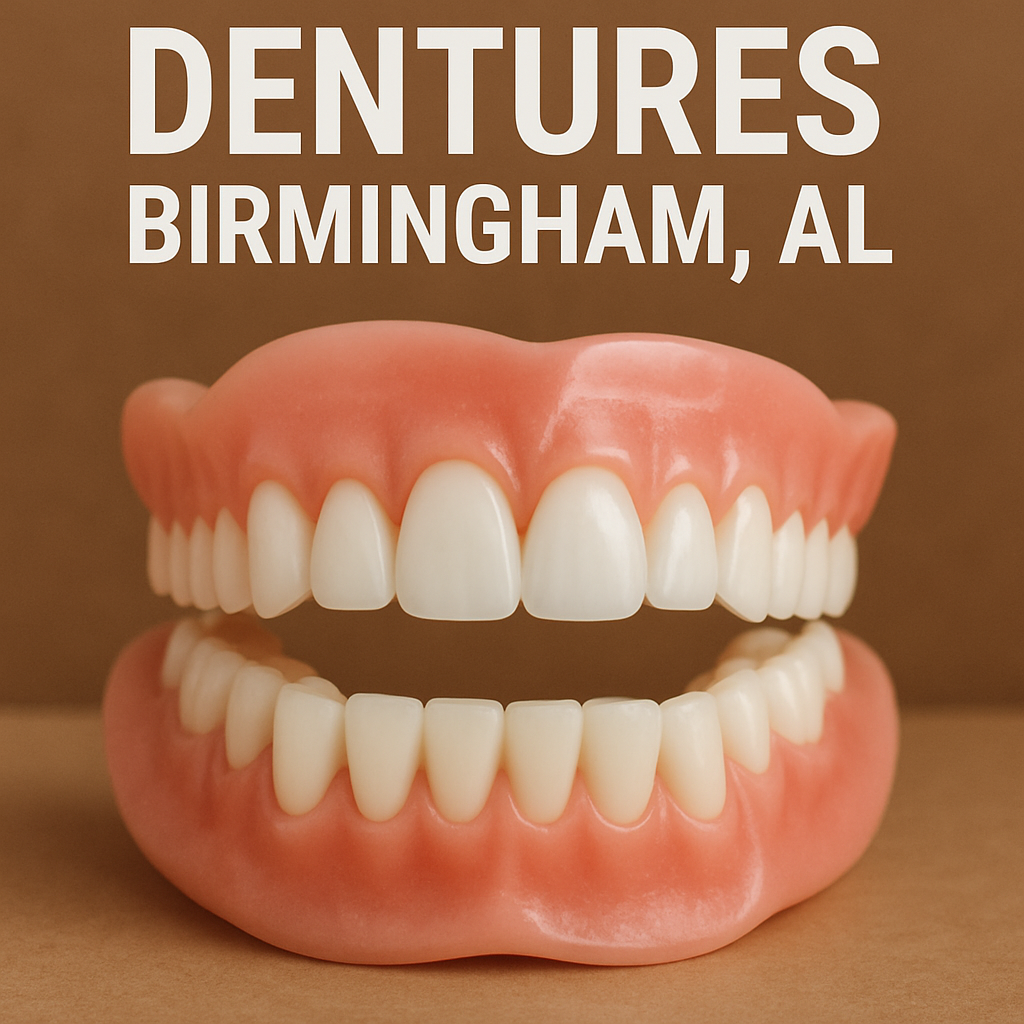This guide explains implant costs, the main types of dental implants, the step-by-step procedure, recovery, and how implants compare to dentures. You’ll get plain-language answers and practical next steps. If you’re exploring options for dentures birmingham al, this article will help you weigh implants vs removable dentures and prepare for a consult.
What Are Dental Implants?
Dental implants are artificial tooth roots made of titanium that are placed into the jaw. A complete implant restoration usually has three parts: the implant (the metal screw), the abutment (the connector), and the crown (the visible tooth). Together they act like a natural tooth.
Main benefits compared with removable teeth include:
- Stability: implants stay fixed, so you can eat and speak confidently.
- Chewing power: implants restore most bite strength compared to dentures.
- Bone preservation: implants stimulate the jawbone and slow bone loss that happens after teeth are lost.
Types of Implant Restorations & How They Compare to dentures birmingham al
Single-tooth implant (crown)
Used when one tooth is missing. A single implant replaces the root and holds a crown. Pros: preserves nearby teeth, looks natural, long-lasting. Cons: higher upfront cost than a bridge for a short span, requires enough bone for placement.
Implant-supported bridge
Best for two or more adjacent missing teeth. Instead of putting an implant for each missing tooth, implants at each end can support a bridge. This saves cost and avoids altering healthy teeth like a traditional bridge would.
Implant‑retained or implant‑supported dentures
For patients missing most or all teeth, implants can support dentures. There are two main types:
- Overdentures (removable): clip onto implants for better retention than traditional dentures and are taken out for cleaning.
- Fixed hybrid prosthesis (permanent): screwed to multiple implants and only removed by a clinician. Feels most like natural teeth.
Compared to traditional dentures birmingham al patients consider, implant options offer much better stability, comfort, and bone preservation. Traditional dentures sit on the gums and can slip, irritate tissues, and accelerate bone loss over time.
The Implant Procedure: Step-by-Step
Initial exam and imaging
Expect a consult with a clinical exam and a 3D scan (CBCT) to check bone, nerves, and sinus anatomy. Your dentist will review medical history, oral health, and treatment options and provide a written plan.
Preparatory treatments
Some patients need extra work before implants: tooth extractions, bone grafting, or sinus lifts to build enough bone for stable implant placement. These steps add time but improve long-term success.
Implant placement and healing
Implant surgery is usually done with local anesthesia and sometimes sedation. The implant is placed into the bone, then left to heal while osseointegration occurs (bone fuses to the implant). This takes about 3–6 months. After healing, an abutment and final crown or denture are attached.
Cost Factors: What Affects Price for Implants and dentures birmingham al
Several factors change the final price:
- Number of implants and type of restoration (single crown vs full-arch fixed prosthesis).
- Need for bone grafts, sinus lifts, or extractions.
- Materials (zirconia vs porcelain), lab fees, and component quality.
- Provider experience and use of advanced technology like CBCT and guided surgery.
Insurance coverage varies. Many practices offer financing. Typical ranges (approximate):
- Single-tooth implant: $2,000–$5,000+
- Implant-supported bridge: $5,000–$20,000 depending on size
- Full-arch implant-retained denture: $15,000–$50,000+ per arch
Prices vary by case. For questions about pricing for dentures birmingham al, ask your provider for a written estimate and payment options.
Recovery, Risks, and Aftercare
Typical recovery: swelling and mild discomfort for a few days after surgery, with most people back to normal activities in 2–3 days. Full bone healing takes months. Contact your dentist if you have severe pain, pus, fever, or loose implants.
Possible complications include infection, nerve injury, sinus problems, or implant failure. Risks drop when you follow post-op instructions, quit smoking, and maintain good oral hygiene. Daily care is similar to natural teeth—brush, floss, and get regular checkups. Implant restorations may need occasional screw or crown maintenance over the years.
How to Choose an Implant Dentist & Next Steps for dentures birmingham al
Ask about training and experience: implant certifications, years placing implants, and how many cases like yours they perform. Confirm they use CBCT imaging and can show before-and-after photos or a patient portfolio. A clear treatment plan should list procedures, timing, alternatives, risks, and a full cost breakdown.
Bring these questions to your consult:
- What are my treatment options and why do you recommend this one?
- How many implants will I need and what is the timeline?
- Do you handle all steps here or refer any parts out?
- Can you provide a written estimate and financing options?
If you’re weighing implants versus dentures birmingham al, book a consult to review options and costs. A good implant dentist will explain trade-offs and give a personalized plan. Call today to schedule an exam and get a clear estimate for your case.





